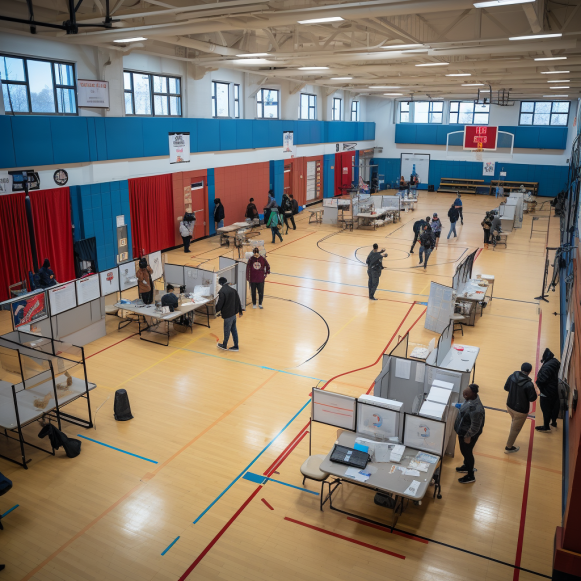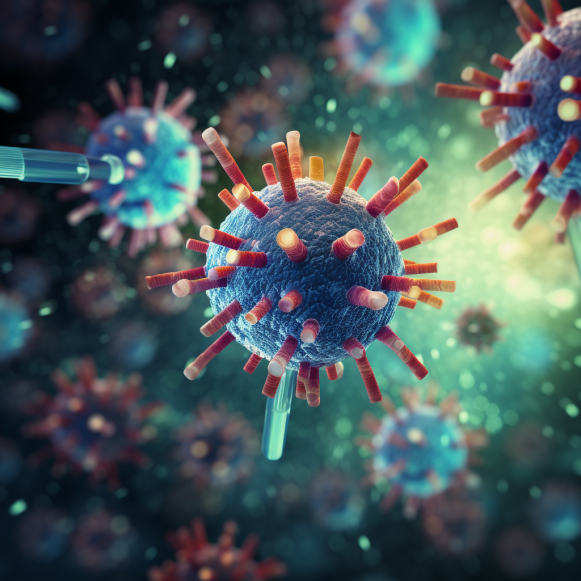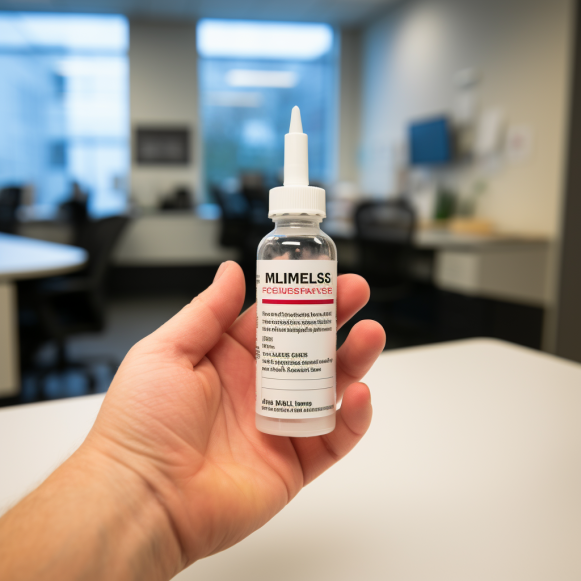Nearly 1 in 3 COVID-19 Vaccine Recipients Suffered Neurological Side Effects: Study

According to a recent study published in the journal Vaccines, nearly one-third of people who received a COVID-19 vaccine experienced neurological complications such as tremors, insomnia, and muscle spasms.
Dr. Peter McCullough discussed the study in a Substack article.
“A shocking 31.2 percent of respondents to this large dataset sustained neurologic injury after two injections with verified data in health registries,” he said in a statement. “The majority of risk estimates indicate that the safety profile is unacceptable.” It is concerning that all neurological societies continue to recommend COVID-19 vaccines, and none have issued product safety warnings.”
According to Dr. McCullough, an excess risk of 20% or greater is considered “clinically important.”
The study looked at 19,096 people who received COVID-19 vaccines in Italy in July 2021, with 15,368 receiving the Pfizer vaccine, 2,077 receiving the Moderna version, and 1,651 receiving the AstraZeneca version.
While Pfizer and Moderna are both mRNA vaccines, AstraZeneca, as an adenovirus vaccine, employs a different mechanism to elicit an immune response.
The study discovered that approximately 31.2 percent of vaccinated people experienced post-vaccination neurological complications, particularly those who received the AstraZeneca jab. Each vaccine had a unique “neurological risk profile.”
The AstraZeneca vaccine’s neurological risk profile included headaches, tremors, muscle spasms, insomnia, and tinnitus, whereas the Moderna vaccine’s risk profile included sleepiness, vertigo, diplopia (double vision), paresthesia (a feeling of numbness or itching on the skin), taste and smell changes, and dysphonia (hoarseness or loss of normal voice).
Researchers discovered “an increased risk” of cognitive fog or difficulty concentrating with Pfizer vaccines.
AstraZeneca Dangers
More than 53% of those who received an AstraZeneca shot experienced headaches, which typically lasted one day. Over 13% developed tremors, which typically went away after a day.
5.8 percent of AstraZeneca recipients experienced insomnia. The study does note, however, that researchers were unsure whether the participants actually developed insomnia or had a “misperception of their sleep quality due to vaccination stress.”
Tinnitus was reported by 2.7 percent of those who received AstraZeneca injections. Tinnitus is a condition in which a person hears ringing or other noises that are not caused by outside sounds.
All of these health complications were more likely to occur after the first dose of the vaccine.
The study hypothesized that AstraZeneca vaccine complications are caused by two factors. “Firstly, the nature of the vaccine, which is a modified adenovirus vector that results in significant and persistent systemic immune activation; secondly, individual vulnerability related to a predisposing biology.”
Pfizer and Moderna Risks
Sleepiness was observed in 39.7 percent of those who received Moderna injections, with the condition typically lasting a week. It suggested that there “could be a strict relationship between the development of sleepiness and immune responses to vaccine/infection.”
According to the study, a “fascinating hypothesis” suggests that influenza vaccines may cause “the selective immune-mediated destruction of orexin-producing neurons, which is T-cell-mediated neuronal damage, thus triggering narcolepsy.”

Narcolepsy is a neurological disorder in which the brain is unable to control the ability to sleep or stay awake.
“Considering that the same can occur for COVID-19 vaccines, future investigations monitoring the new-onset hypersomnia findings in vulnerable individuals are urgently needed.”
Hypersomnia is the inability to stay awake and alert during the day, despite having gotten plenty of sleep at night.
About 15.9 percent of people who received Moderna shots experienced vertigo, a sensation in which the individual believes they or their surroundings are moving or spinning. It usually lasted one day.
Paresthesia, defined as a feeling of numbness or itching on the skin for no apparent reason, was reported in 14.5 percent of Moderna vaccine recipients, but it resolved within a day.
Diplopia, also known as double vision, was reported by 2.7 percent of those who received a Moderna injection and lasted for about a day. “Symptomatic people showed an increased risk to develop diplopia after the second dose, as if a reactivation of the immune response was necessary to trigger diplopia.”
Meanwhile, approximately 6.4 percent of Pfizer vaccine recipients experienced cognitive fog, which usually cleared up within a week.
“Brain fog is a type of cognitive impairment that presents as a ‘foggy brain state’, including a lack of intellectual clarity, difficulty with concentration, mental fatigue and anxiety,” according to the report.
“As explanations for this phenomenon in COVID-19 patients, hypotheses such as systemic inflammation crossing the blood-brain barrier, neuroinflammation after viral infection leads, and microglial activation are emerging.” Another possibility is that symptomatic people have subclinical cognitive dysfunction prior to vaccination, and that vaccination is a trigger.”
Females Are Particularly Affected
Females were found to have a “increased risk of developing neurological complications” following COVID-19 vaccination, according to the study. “Our findings are in line with those of a recent study that revealed that several factors, including the female sex, were associated with greater odds of adverse effects,” according to the report.
According to the researchers, greater female susceptibility to the vaccines’ neurological complications could be due to “genetic and hormonal factors.”
Males have one X chromosome and one Y chromosome, while females have two X chromosomes. The X chromosome, which “contains the most prominent immune-related genes in the human genome,” can also result in “stronger inflammatory immune responses,” according to the study.

Furthermore, estradiol, a primary female sex steroid, activates a specific immunity process that produces “antibodies against infections.”
Comorbidities were also mentioned in the study. Comorbidity is the presence of more than one disease or condition in the body at the same time, which may or may not interact with one another.
“The evidence that immune system dysfunctions (allergies/immunodeficiency disorders) are frequently reported in our symptomatic group is more than a chance occurrence,” the study’s authors stated.
Comorbidities were found in 47.6 percent of AstraZeneca vaccine recipients, 38.8 percent of Moderna vaccine recipients, and 41.5 percent of Pfizer vaccine recipients, according to the study.
Both allergies and non-neurological diseases were reported in the AstraZeneca group. “A history of antitumoral and anticoagulant drugs was more frequent in this population,” according to the report.
Allergies were observed “more frequently” among Moderna and Pfizer recipients. While some of those who received Moderna had a history of neurological diseases and blood transfusions, as well as prior COVID-19 infection, those who received Pfizer vaccines had a history of immunodeficiency disorders.
Despite the fact that the study detailed neurological complications associated with COVID-19 vaccination, it acknowledged some limitations.
“Firstly, our results should be interpreted with caution because of a possible overestimation of neurological events resulting from the self-reported symptoms,” according to the report.
“Secondly, we evaluated the risks associated with the first and second doses of the vaccine; however, the data concerning the second dose were limited, thus representing a potential bias in the study.”
Despite acknowledging its limitations, the researchers concluded that “clinicians should be aware that several neurological complications may commonly occur after COVID-19 vaccines.”
“Caution should be used when administering COVID-19 vaccines to vulnerable people, such as to those who suffer from allergies,” the authors of the research wrote. “We strongly believe that our findings are relevant for public health regarding the safety of vaccines in a large cohort.”
The Epoch Times sought comment from Moderna, Pfizer, and AstraZeneca.
Additional Neurological Discoveries
Several other studies have found evidence that COVID-19 vaccines are associated with neurological complications. A study published in the journal Neurological Sciences in October 2021 stated that the “most devastating neurological post-vaccination complication is cerebral venous sinus thrombosis (CVST).”
CVST occurs when a blood clot forms in the brain’s venous sinuses. According to Johns Hopkins Medicine, this prevents blood from draining from the brain, resulting in blood leaking into brain tissues and forming a hemorrhage.
The study discovered that CVST was “frequently reported in females of childbearing age,” most of whom received an adenovector vaccine. Individuals who received mRNA vaccination developed Bell’s palsy, a condition in which facial muscles weaken or paralyze.
A similar study published in Current Neurology and Neuroscience Reports in November 2022 found “a greater than expected occurrence of severe neurological adverse events.”
The following month, Dr. McCullough cited this study in an article.
“Because the vaccines contain lipid nanoparticles loaded with genetic material that code for the damaging Spike protein, each patient faces a Russian Roulette of whether or not the nervous system will be hemodynamically showered with the damaging vaccine particles,” he wrote in his paper.
Despite studies indicating a risk of medical complications, some experts continue to recommend COVID-19 vaccinations. Both Pfizer and Moderna, according to John Hopkins Medicine, are “highly effective in preventing serious disease, hospitalization, and death from COVID-19.”
It advised people to get a COVID-19 shot because “we believe that their benefits outweigh their risks,” according to Johns Hopkins Medicine.
The American Academy of Neurology (AAN) recommended COVID-19 vaccine mandates for health care employees in a position statement issued in 2021, and it supported vaccinations for children under the age of 12.
Dr. McCullough, on the other hand, argues that COVID-19 vaccines are “determined to be unsafe for human use” by the World Council for Health and the Association of American Physicians and Surgeons.






